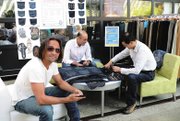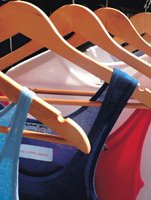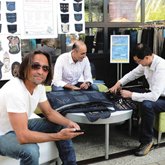Kingpins Changes Los Angeles Dates, Adds Hong Kong Edition
The mood was upbeat at Kingpins, the denim sourcing show produced by New York–based fabric agent Olah Inc. Held Aug. 11–12 at The Smog Shoppe in Culver City, Calif., the West Coast edition of the show came a full two months early this year. Designers shopping for Fall 2010 sources perused offerings from 20 exhibitors, including Japanese trading company Amhot, Vietnamese piece-dye producer Burlington, South American hardware-maker Apholos, Chinese piece-dye producer Zhonge, Japanese and Chinese corduroy maker Rainbow, Turkish jean maker Denim Village, and Guatemalan jean maker Denimatrix. Denim mills Cone Denim, Denim North America, Kurabo, Orta and Tavex showed Fall 2010 fabrics.
“This is a serious, focused, working show,” said Brad Mowry, Olah’s managing director of West Coast operations. “We moved the show up two months [from October] to land before [the] Project [Global Trade Show in Las Vegas]. This way, designers come here with an open mind to sourcing options and are in serious shopping mode still and not just casually browsing.”
Shopping Kingpins were designers for brands such as Lucky Brand Jeans, Agave, 7 For All Mankind, Levi’s and BCBG. In total, 118 brands shopped the show.
Andrew Olah, chief executive of Olah Inc. and founder of the Kingpins show, deemed the show a success and its biggest ever. “We got it just right. There’s a great mix of vendors and a great vibe. Buyers come in, work casually with five to six denim mills, feel good and then have fun,” he said. The success of this West Coast show bodes well as he and his team gear up to present Kingpins in Hong Kong Oct. 7–8.
“There’s nothing like Kingpins in Hong Kong, but many of the brands we work with have major offices there. We think they would benefit from a show like this,” Olah said. Olah, who also produces Kingpins biannually in New York, said the Chinese version of the show will follow the same laid-back, intimate model it has established in the United States.
Designers shopping the show focused on vintage-inspired fabrics and stretchy fabrics good for the latest denim trend—leggings—said a representative for Kurabo Japan. One non-denim fabric earning interest among denim designers is a piece-dyed prepare-for-dye selvage fabric that mimics the look of denim, right down to the tell-tale red selvage thread.
“Changes in denim are always very subtle. Right now vintage washes are popular, and seeing them all assembled here is good,” said Stefano Aldighieri, founder of Another Design Studio, a denim design firm.
Bobby Tohma, owner of the Japanese Amhot International trading company, produces his own trade show in New York and participated in Kingpins for the first time. Shirting and lightweight Japanese denim garnered the most interest from West Coast designers, he said. Novel items such as indigo prints and indigo knits from India also appealed to designers.
Denim Village, a Turkish jeans manufacturer and a subsidiary of Orta, the Turkish denim mill, specializes in producing jeans with a vintage sensibility, said Banu Acun, a senior sales representative. Making 4 million pairs of jeans per year, Denim Village counts brands such as Gap, Acne, Replay, Ksubi and Sass and Bide among its clients. Acun said West Coast brands expressed particular interest in its product-development capabilities.
Drew Bernstein of Kill City shopped the show to keep abreast of what’s going on in denim, he said. Bernstein is expanding his denim offering and found denims finished with ozone or laser treatments of particular interest.
Elena Rusenescu, senior denim designer for Lucky Brand Jeans, sourced Fall goods with a focus on “newness in fabric and finishing.” Mid- to lightweight fabrics were tops on her list, as were heavier denims with a super-soft hand.
























